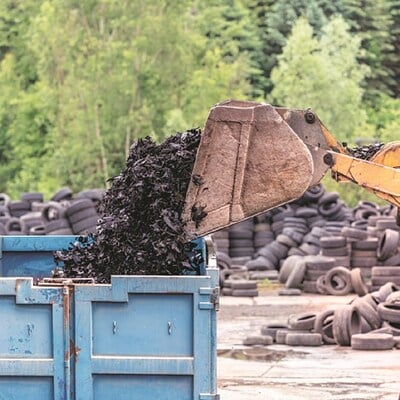[ad_1]
New Environmental Compensation (EC) guidelines to strengthen waste tyre management have been approved by the Ministry of Environment, Forest, and Climate Change (MoEFCC).
Manufacturers not meeting their Extended Producer Responsibility (EPR) targets will face penalties of up to Rs 8.40 per kg of waste tyres.
The guidelines also impose a fine of Rs 25,000 for violations under the Hazardous and Other Waste (Management and Transboundary Movement) Amendment Rules, 2022. The fine can increase to Rs 1 lakh if the offence has been repeated. Additionally, a penalty of up to Rs 8.40 per kg will be levied on producers who inaccurately report the quantity of waste tyres they have. The government will also charge additional administrative expenses.
EPR is a policy tool that shifts the responsibility for a product’s environmental impact beyond its initial production, placing it on the producer throughout its entire life cycle, including its end-of-life management and disposal.
These measures aim to enhance accountability and ensure proper waste tyre disposal. However, sector experts say while monitoring compliance is difficult, the real challenge lies in enforcing the law.
“The guidelines are good, but implementation should be made more stringent,” said Debadityo Sinha, lead for climate and ecosystems at the Vidhi Centre for Legal Policy.
The action came months after the government mandated that producers fulfil their EPR obligations by purchasing EPR Certificates from registered recyclers.
The Central Pollution Control Board has asked all producers to fulfil their assigned EPR obligations for FY23 and FY24.
Recycling processes aim to reduce the environmental impact of waste tyres by diverting them from landfills and converting them into valuable resources for various industries. The final outcomes of recycling waste tyres include reclaimed rubber, crumb rubber, crumb rubber modified bitumen, recovered carbon black (suitable for use as a raw material in new tyre manufacturing), and pyrolysis oil or char (exclusively utilised as a fuel and not for producing new tyres).
Manufacturers and importers of new tyres in India face escalating recycling responsibilities under the EPR regime. Starting with 35 per cent of their 2020-21 production/imports in 2022-23, the target climbs to 70 per cent in 2023-24 and reaches 100 per cent of the previous year’s production from 2024-25 onwards.
New units join the programme after two years, hitting 100 per cent responsibility in the third year. Waste tyre importers have an even stricter task with managing 100 per cent of the tyres they imported in the previous year, with import for producing pyrolysis oil or char explicitly banned.
Currently, in the producer category, there are 52 original equipment manufacturers and 126 importers, while 355 recyclers have submitted registration applications. Of these, 130 producers and 164 recyclers have been granted approval.
Firms will face a fine of Rs 25,000 for violations, which can go up to Rs 1 lakh for repeat offenders
First Published: Sep 05 2024 | 7:22 PM IS
[ad_2]
Source link

